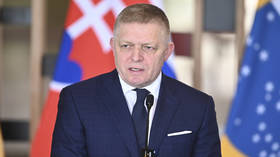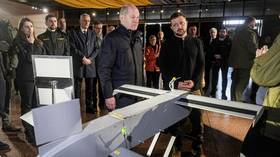'Let people have their say'
It is vital to form a technocratic government in Palestine and call for presidential and legislative elections, said Palestinian leader Mahmoud Abbas in an exclusive interview with RT.
RT: Your Excellency, this is your second visit to Moscow this year. Eight months ago you met President Putin, and now you have just met with President Medvedev. What is the message you have this time?
Mahmoud Abbas: It's the first time I have met with president Medvedev. We had a broad agenda: such as mutual relations between Palestine and Russia, in addition to other issues like economic and security cooperation and many other perspectives and agreements, those which were implemented and those in need of renovation and amendment. We also talked about the political situation and what role Russia can play – that is Russia on its own – which I believe would be an important one, as well as Russia's role as a Quartet member, and as well as facilitating the road map obligations and the Arab peace initiative – the “land for peace”.
Israel has to withdraw from the occupied territories for the sake of normalisation of its relations not only with the Arabs, but with all Islamic nations. If this framework is established, then all other issues will be minor. Russia is a superpower, and we count on Russia’s role whether on its own or through the UN Security Council.
RT: The UN Security Council has reached a new decision with respect to the Middle East. During a Security Council meeting, Condoleezza Rice has delivered a speech saying that for eight years the American Administration has achieved huge success in the Middle East in general and in Palestine in particular. She also said that the ongoing negotiations are the evidence of this success. How do you evaluate this statement?
M.A.: Let me stress here that the American role began only in the last year of the American Administration and not during its eight years. For seven years, we did not have any communication with the Americans.
However, this is the first time that all core issues are being addressed, and Rice confirmed and fixed that the 1967 borders are the West Bank, and this was denied by the Israeli party. The UN Security Council resolution called for the continuation of the peace negotiations and for holding the peace conference in Moscow, which is very important. These are the results of one year only, not eight years.
RT: Just days before the truce between the Palestinian parties and Israel came to an end, the Palestinian organisations accused Israel of violating its commitments under this truce and they threatened not to renew it in the future. Do you think Israel might propose a new truce?
M.A.: Efforts were made to fix this truce and direct talks were made with Mr. Olmert and his institutions, with [Egyptian] President Mubarak and with U.S. President Bush on the subject. From our part, we wish that this truce be implemented fully, though we are not party to the negotiations. Hamas, who occupied Gaza, is the concerned party and is carrying out these negotiations.
We cared about this truce because we care about easing the suffering and agonies of our people there. The truce, which the two parties did arrive at, is different from the Israeli soldier Gilad Shalit’s case, which is still unsettled.
However, violations of this truce did occur. Whenever rockets are launched, Israel closes the four crossings and this affects the people there. As for the Rafah border crossing, it was opened through a five-party agreement, concluded by Israel, America, Europe, Egypt and Palestine. Hence it cannot be re-opened except through this five-party agreement. It is not right to relate these four crossings with this one. The Ariz and Karam abu Salem crossings are important for people, and the other two is important for fuel, goods and other things. So we do believe that these crossings are important.
RT: A national reconciliation, in which you play a great role, remains the most important issue. What are the future steps towards it?
M.A.: After the Hamas coup many Arab initiatives were presented, and crystallized in the Yemen initiative. There we did not succeed because of differences in opinion, and we moved to the Damascus summit in which the Yemeni initiative was fixed and became an Arab initiative. Egypt was assigned the role of communicating with all Palestinian factions which all agreed on a meeting to be held in Cairo on November 9.
During my visit to Egypt a few days before the set meeting, the Egyptians briefed me on the agreement draft and I accepted it. Later, they informed me that Hamas rejected this agreement and had 13 reservations about it, to which I also agreed. By the time delegations began to arrive in Cairo, Hamas declared it would not attend the meeting for unknown reasons, some of which are trivial and weak ones which led to the failure of this meeting.
Later, in the Foreign Ministers’ meetings in the Arab League, the parties called for the necessity of continuing dialogue, and stressed the important role and efforts made by Abu Mazen in the national reconciliation dialogue. And this means holding Hamas responsible for hindering it, though this was not stated in the final document. Now, I myself called for the necessity of continuing this dialogue in order to arrive at a settlement.
RT: You are the president of all Palestinians. Doesn’t this deserve an initiative on your part?
M.A.: True, and I did make an initiative for dialogue which was welcomed by all nations, except Hamas. I am ready to accept any suggestions. All we need now is to form a technocratic government, neither from Fatah, nor from any other destination, and to call for elections. Why are they refusing elections, through which, I confess, they came to the legislative council by achieving majority? Why do they fear free elections? Let the people have their say. Should they want Hamas, then I would hand them power. All states go to the people when there’s turmoil, in Kuwait and other states. Either through a public poll, or through elections, I am ready for this. However, they rejected all these calls.
RT: Did you try to meet [Hamas leader] Khaled Mashaal in Damascus?
M.A.: Frankly I do not want to meet with Khaled Mashaal since I have nothing in common with him. What we have here is a Palestinian issue. We all agreed, as Arabs, on the necessity of the dialogue, and on the Egypt’s role in this dialogue. Meeting with Mashaal would be fruitless and unacceptable.
RT: Now to the argument over the peace process in Palestine. Do you see this happening in the future with a new Israeli government?
M.A.: We are ready to continue with any person elected after Olmert on the condition that we continue the dialogue from where it ended, as we do not agree to start from zero. So far we have discussed fully about six or seven issues and we know the demands and obligations of each party with respect to these issues. We are ready to talk with any prime minister elected after Olmert on this condition. Hence, we have drawn Israelis’ attention that the new person should recognise the achievements of our talks and continue the dialogue – not deny and reject them.
RT: Up till now, Israel has not signed any document?
M.A.: Nor did we. In fact, we do not want to sign any document. We demand the settlement of all things. We do not accept partial solutions. This does not mean we go back to where we began. All core issues should be dealt with and settled. If we agree on five issues out of six, I would not sign an agreement. I would sign only a final settlement.
RT: Some say that the presidency term might be extended while others say elections shall be made on time. What do you say about this?
M.A.: Extension of the presidency term is unconstitutional. Therefore, I am calling for presidential and legislative elections. I want the Palestinian people to settle down and to accomplish its Palestinian state with Jerusalem as its capital.
RT: Your Excellency, you and many others pin your hopes on the coming American Administration. Did you receive any signs or have things remained suspended as they are?
M.A.: We've known president Obama since he was a member of Congress, though we knew little about him. He used to visit us among other members of Congress. However, during his presidential campaign he paid me a visit and we were talking for one hour. We concentrated on the Arab peace initiative which requires extra care and attention by all parties – not only by the Israelis or the Americans, but by the Arabs also.
We did feel that president Obama might be able to understand things quickly, but we don’t think that there would be a strategic change in the American policy with one president going out and another taking office. What could change is the approach, the means of communication with the concerned parties, and the understanding of certain issues. We don’t believe in a strategic change in the American policy. It would be a misjudgment on our part.












